William Hurrie/ Hurry
Biography
Ringer of The Liberty Bell

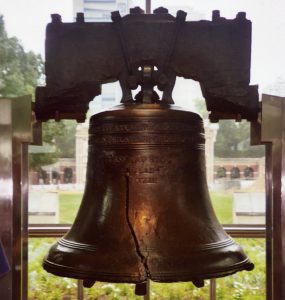
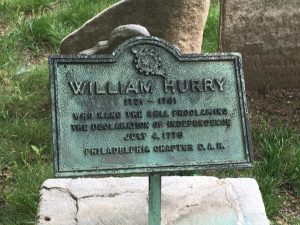
William died in 1781 and was buried in the church yard at the Old Pine Street Presbyterian Church. Over the years, William’s stone became buried and was lost. One day the sexton of the church unburied it and William’s burial location was covered in many newspaper articles. Later, DAR recognized William Hurrie for his support for the Revolutionary War as shown in the marker above.
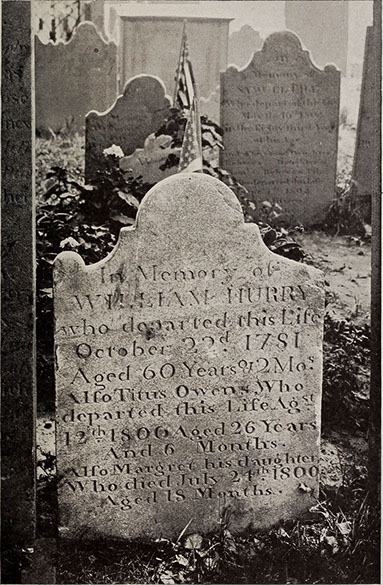
WIlliam Hurrie/Hurry’s Gravestone at Old Pine Cemetery Philadelphia, PA
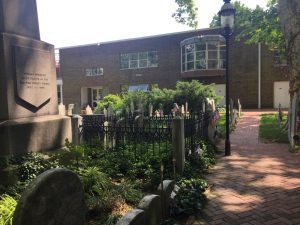
William Hurrie’s grave is near the lamp post with the family plot lying beyond the fenced area and immediately to the left of the sidewalk.
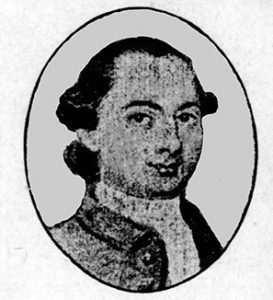
If you tour Independence Hall or visit the Liberty Bell in Philadelphia, you will most likely hear the name William Hurrie mentioned as the man who rang the Liberty Bell when Independence was declared.
The Controversy
Who rang the bell that day is not 100% certain. However, most historians generally accept William Hurrie as the bell ringer on July 8, 1776 when the Declaration of Independence was signed. DAR has also recognized his service.
Not everyone, particularly the family of the official doorkeeper of the State House (Independence Hall) in 1776, agreed that William Hurry was the bell ringer who tolled the bells calling people together the day the Declaration of Independence was read. In July 1908, Clarence P. Wynne made a plea to the Philadelphia Chapter of the Sons of the American Revolution that Andrew McNair, the official doorkeeper, was actually the bellringer. However, McNair has not been accepted by most historians as the bellringer on that date despite his position as doorkeeper at the time.
Records indicate that Andrew McNair was absent at least one day during that period and the conclusion by historian is that he was absent on that very historic day. The argument for William Hurry as the bell ringer comes from the records at Old Pine St. Church. William Hurry attended this church and was an early sexton for the church. He was referred to as the old bell ringer and the story of him ringing the Liberty Bell for the reading of the Declaration of Independence was told.
To read more about the controversy:
- The Real Story of the Liberty Bell [part 1] [part 2]
- Attack on Traditions
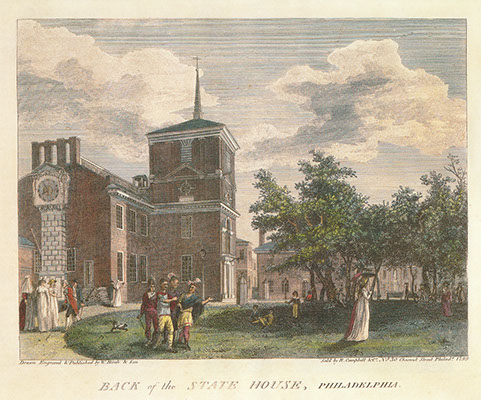
By William Birch & Son. Public domain, via Wikimedia Common
Official Doorkeeper
William went on to serve as official doorkeeper for the State House beginning March 4, 1777 and concluding when he fell ill just before his death in October 1781. During that time, he served the House of Representatives of the Commonwealth of Pennsylvania and the Continental Congress.
His role was very broad and extended well beyond being the doorkeeper. He often procured items for these bodies, such as, candles and firewood. And, he even was charged with escorting Gunning Bedford Esquire to the city jail when his behavior did not align with the accepted behavior of the Continental Congress. In addition, he was paid for nursing soldiers and for cleaning out the State House after the British occupation. William, along with Robert Patton the messenger to Congress, was also paid in 1778 for extraordinary service, which was of an unknown nature.
During these early days of our country, currency was very unstable. Thus, William’s salary increased at warp speed at times. Over a short period of time it skyrocketed from a dollar a day to forty dollars per day.
William’s son-in-law Joseph Fry succeeded him as doorkeeper of the State House, serving in that capacity until late in 1799.
Read more about William Hurrie’s family . . .
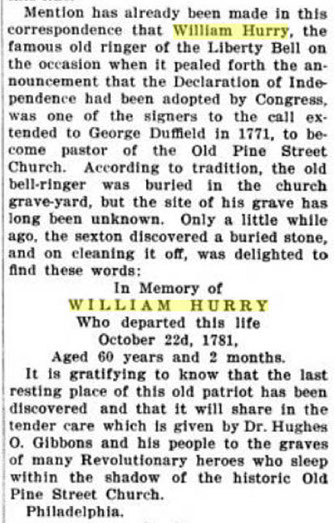
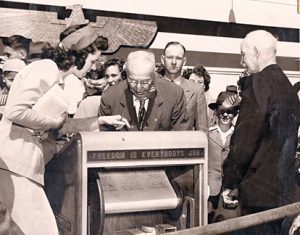
Judge Klinefelter, 3G Grandson of William Hurry, signs the register at the Freedom Train in 1948
.
Supporting Records & Articles
The Declaration of Independence
The Story of the Declaration of Independence
Who First Rang Old Liberty Bell?
William Hurrie on Find-a-Grave
*Many of these articles were included in multiple newspapers.
Stories of Descendant
Hodge
Inglis
Kircher
Peebles
- Bellman’s Grandson to Greet Old Relic
- Bell Tolled by his Forefather
- Ancestor Rang Liberty Bell
- Direct Descendant of Bellringer
- Ringers Kin to See Liberty Bell
Thomson
- Ring, Papa, Ring! The Story of an American Family
- Six Descendants of Hurry to see Liberty Bell
- Six Descendants Coming
- 1948 Freedom Train
- Liberty Bell Ringer’s Descendants Visit Freedom Train
- History Rang ‘Oer the Plains
Unproven Claims of Kinship
- Hurry of KC: Believes he descends from Wm Hurry
- Hurrey Stentz: Claims relationship to William Hurry
- Herbert Threadgill Hurrie: Claims relationship to Wm. Hurry
- Moses: Relative of William Hurry, Old Roads Out of Philadelphia
- King: Claims Wm Hurrie as Great-great Grand Uncle